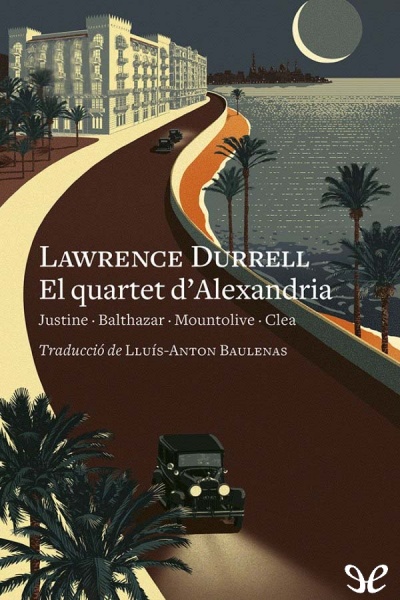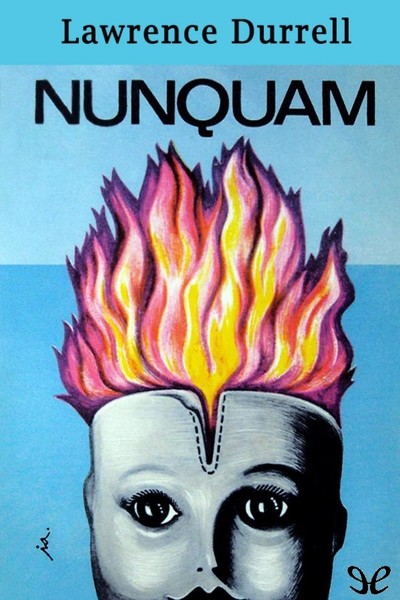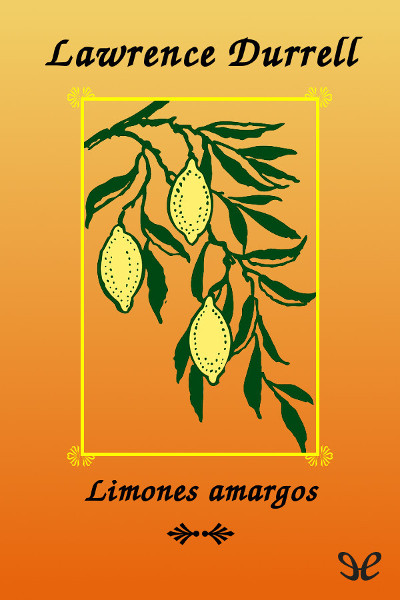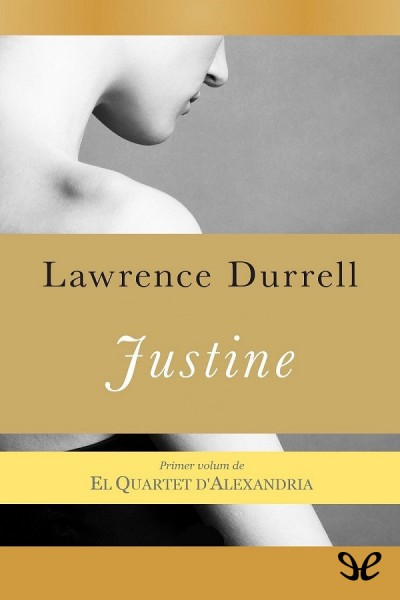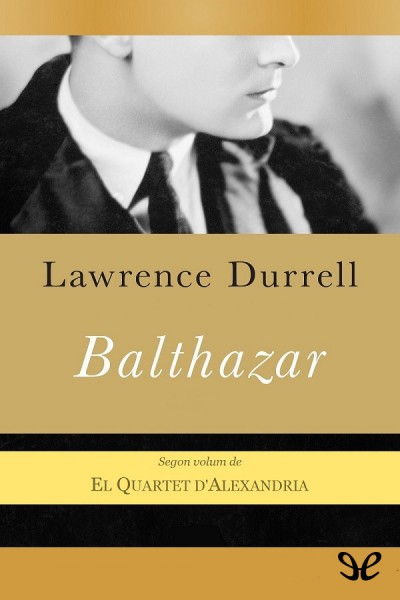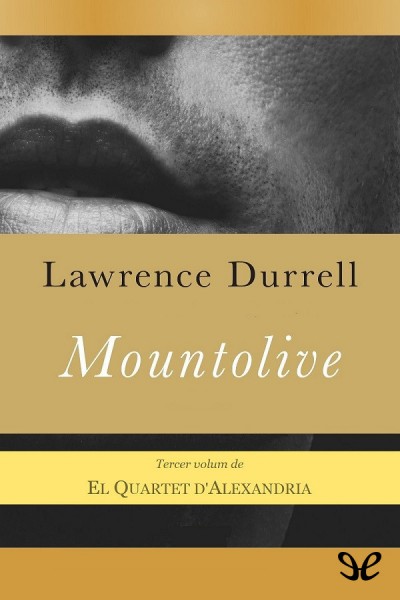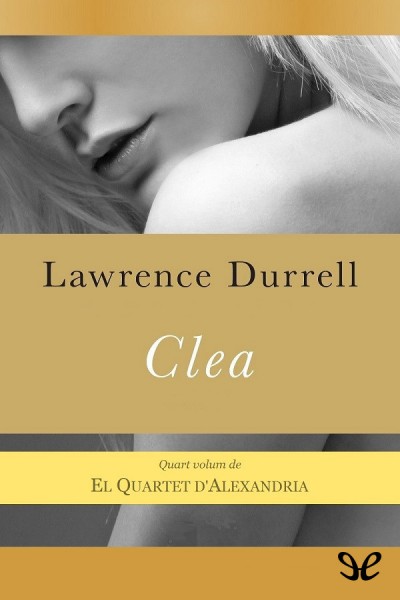oleebook.com
The Avignon Quintet: Monsieur, Livia, Constance, Sebastian and Quinx de Lawrence Durrell
de Lawrence Durrell - Género: English
Sinopsis
The Avignon Quintet gathers Lawrence Durrell's five kaleidoscopic, Booker Prize-nominated novels - orbiting around the South of France in World War II - into one epic modern classic, one of 'the greatest novels of our time' (Sunday Times).
'Durrell is a magician. He juggles with glittering words, he conjures up "cloud capped towers, gorgeous palaces and solemn temples," he entrances, intrigues and impresses.' The Times
Avignon: the kingdom of kings and Popes, capital of the historic South of France, heart of legendary Provence. The entwined lives of a group of friends - and lovers - are transformed forever by the outbreak of World War II. But their dramatic present only plunges them further into the darkness of an ancient past, as they become entangled in buried plots, gnostic cults, religious rituals, and a mysterious hunt for hidden Knight's Templar treasure.
From Hitler's Europe to the medieval world, French chateaus to Egyptian deserts,...
Descargar
Descargar The Avignon Quintet: Monsieur, Livia, Constance, Sebastian and Quinx ePub GratisLibros Recomendados - Relacionados
Reseñas Varias sobre este libro
Lawrence Durrell is not an easy author to read. His prose is long, fabulous, filled with wandering soliloquies and journeys into the human heart, mind, spirit which at first can seem completely lacking in intention and purpose, and mere descriptive play and fascination with the written word.
He writes on a number of levels and performs immense spatial-temporal tricks with both setting and characters so that at times it is difficult to understand not just where one is located in one's reading of the novel (taken as a group of five) but if one actually exists within it. Durrell speaks to those who can hear, and you may find yourself wondering whether you are a character he has written into the prose, living as one of the protagonists on simply another plane of his imagination.
adult-or-mature all-time-favourite historical ...more42 s Warwick882 14.9k
In the margin of a book she had borrowed from Sutcliffe she had found the scribbled words: The same people are also others without realising it.
I was last in Avignon a couple of years ago, for our babymoon. That photo was taken from the famous bridge (which by the way does not meet even the most minimal demands of a bridge, failing to make it more than halfway across the river).
Books and poetry are part of the very stonework of Avignon. Not literally; that would be architecturally foolish. But among other things, it was in these streets, at one of the local churches, that Petrarch first caught sight of the mysterious Laura, on 6 April 1327. They probably never met or spoke, but he went on to write a foundational collection of European poetry based on how hot he thought she was.
I was reading the Canzoniere during our last visit, and interspersing it with the last of Durrell's five loosely-connected novels set around the town, which I had been reading off and on for months. They are not a quick read. Indeed when I think of them as a whole, I think mostly of the flaws and the imperfections, which at the time were very upsetting to me because I had been blown away by the Alexandria novels. But I still can't bring myself to give this sequence less than three stars, just because it is so formally interesting the whole thing is some enormous act of literary hubris, which after all is what good writers should be attempting.
The first book is probably technically the best, and after that they get progressively shorter, less controlled, and less interesting. With a few honourable exceptions. Although I formal experimentation, in this case I found that it just weakened any emotional power the narrative might have had. The first book, for instance, turns out to be fictional even within the scope of the quintet, written in its entirety by a character that we meet later. A potentially wonderful idea, except that Durrell doesn't return to it or explore it in any interesting way: he just lets it sit there.
The prose style is so uninspiring, considering it comes from the same man who produced Justine! It's really bizarre. There are sentences here that repeat themselves in the clumsiest way imaginable:
Here they were to bury themselves in the three-cornered love which had once intrigued Blanford and caused him to try to forge a novel round the notion of this triune love.
Wow that's ugly. There are terrible metaphors and similes that seem striking for all the wrong reasons I see flicking back through my copy that I have underlined in horror the phrase the dry marsupial pocket of the rarely used vagina, which if anything is even worse in context than it is in isolation.
The last book, Quinx, might as well have been called Contractual Obligation. There is a horrible sense that he simply did not know how to tie his ideas and experiments together. It's full of the worst kind of pseudo-profound philosophising, comprising pages and pages of stuff this:
The day when Aristotle decided (malgré lui) that the reign of the magician-shaman was over (Empedocles), was the soul's D-Day. The paths of the mind had become overgrown. From that moment the hunt for the measurable certainties was on. Death became a constant, the ego was born. Monsieur came down to preside over the human condition.
And yet through all of this, part of you cannot help admiring the effort to try new things: is this character an alternate-reality version of the one in the last book? Is this character the one that was invented by the other guy? And so on. There are some very memorable set-pieces, including one scene of a character spying on a brothel that has stayed crystal-clear in my head. And occasionally the efforts to find new types of phrasing do pay off:
An idea is a rare bird which cannot be seen. What one sees is the trembling of the branch it has just left.
Sadly, digging for these gems is hard going, and the structural experimentation, instead of playing to the story's strengths, fights against them. If it had been full of beautiful sentences I would have loved it fiercely, but as it is, it's full of something else. It's stayed with me since I read it: I find it interesting but rather cold. Not so much a true novel sequence as a complicated equation.alexandria avignon egypt ...more33 s T Fool86 9
These interconnected five can be read as a love story, but one isnt fully sure whose until deep into the book. The reader has several choices along the way (Piers, Sylvie, Bruce, Sabine, Hilary, Sam, the Prince, Pia, Livia, Constance, Aubrey this is not an exhaustive list), and the way complicates itself by embedding a main fiction at its start.
The themes are all there early: traditions in the land, hidden treasure, sexual license, religious heresy, politics. From the pages of Monsieur grows a novelistic microcosm of what continues throughout the Quintet whose factuality we come quickly to see. The larger story contains the real world of occupied Provence, of Switzerland, of Egypt around the time straddling World War Two.
Generally. The veracity of several characters, the self-awareness of others, the epiphanies reached by some, all combine to blunt any edge one might want to find between whats gone on after all is said and done and whats not. Better: whats been most important and what less so in bringing us to books end. Sabines gypsy life, Quatrefages archaeological obsession, Constances steadiness, Sylvies sexual fragility, the Princes worldliness these and a dozen or more profiles interact and sometimes interchange. Taken together, they become a spiritual composite, one character flashing in alternate guises the multi-valent complexity that humanity is.
This novel can be read as a love story, but amorousness might also be taken as the close focus of a novel intended to show how historical forces disrupt lives. The era is roughly the same as that of Durrells The Alexandria Quartet, this time mostly the other side of the Mediterranean Sea. Egypt does play a part here, too, though, as does the British Foreign Service, and even sprinkled a few times around are a couple of characters from that Quartet (Melissa, Pursewarden).
Espionage. War danger. High stakes behavior. With the Quartet, a subterranean feature was the future of Palestine. Here, in the Quintet, two motifs emerge: 1) the Knights Templar; and 2) Gnosticism. Both offer treasures of a kind, and both treasures are problematic, hard to get at. They take on spiritual and worldly aspects: the Templars a sodality of warriors entrusted with holy office; the Gnostics dismissing as vile all materiality by revering ascetic practice, yet forming societies in the here-and-now to disparage and physically to eliminate the material kill in order to attain the spiritual. Are they to be seen as acting-out the same plan?
Just how actual are either Gnostic vehemence or Templar substantiality is part of the Quintets mystery. Their effect on the characters, if only from skepticism, greed, or curiosity, is tangible. Durrells playful, sometimes flatly profane, way of handling sacred ideas invites us to read him as satirist, yet the work gives a comprehensive impression that the full range of human actions help explain the potency residing in our notion of the godly.
As to frank sex, LD may be unsurpassed, yet before one starts riffling out the good parts, one should get ready to redefine what good parts means. This master of bodily juices and joints presents an awareness of just how spiritual the physical is no ditherer he, about the linkage between psyche and orgasm. The serious love scenes are no sop to sentimental values, but present how meaning is found Serendipitously? Fatefully? when humans, in good faith, match.
This is not a work manageable at one reading, and its worth mentioning that its telling both undercuts and enhances the yarn rolled into the almost 1400 pages. Our author Durrell features a character Blanford who is deemed as the novelist among the characters. Within his fiction is a novelist Sutcliffe, an alter-ego against whose wit and opinions we find Blanford playing throughout significant usually transitional portions of the Quintet. Sutcliff, in fact, takes on tangible form for the others in ongoing parts of the book, is met and known by the other characters, is part of the larger circle of acquaintances.
One puzzles over the relevance of what seem their conversational exchanges, their word play, fragmentary notes hinging close to the novels matter, but not forwarding it much. We get to accept this partly on the grounds of establishing the character of Blanford and his Sutcliff, and, moreover, to visit philosophical notions from comic observation rather than from narrative experience. The banter between the novelists is something of suggestive, high-caliber clowning this side of insult humor, a clash of intellect and wit. Stabs at joking-out meaning. Kibitzing the truth.
At one point, Blanford relays hearsay from Sabine, her observation applying to his still-to-be-written novel (which either is the first one weve already read, or the actual full book of five novels in our hand?):
As for the book it was a hopeless task, for what is to be done with characters who are all the time trying to exchange selves, turn into each other? And then, ascribing a meaning to point-events? There is no meaning and we falsify the truth about reality in adding one. The universe is playing, the universe is only improvising!(italics original)
A main character, Constance gets portrayed straight and bright and rational and dutifully studious, a woman trained in Freudian analysis, a psychiatrist. It isnt until she comes in contact with Affad, an Egyptian disembarrassing himself from the world, that she understands the potential of love, makes sense of her past and nurtures a fuller future. A potential future. As Sabine, intuitive with years of gypsy life, enlightens us, We have as many destinies stacked up inside us as a melon has seeds.
Durrell takes hold of the notion that our consciousness is a potential one, overladen and corrupted by extraneous chance, but contains natural virtue if only life is left alone to be lived not institutionally warped or brain-parsed of its suppleness. In that sense, we witness a kind of Romantic vision. But this is not romance, easy resolution after an obstacle is overcome its hard to conceive of anything more adult, more truly human, than the relationship Constance and Affad conceive, difficult to attain, but one that others find a template. That there is no resolution draws us away from the false. Novels resolve. Living ends.
If it were only his development of character and idea, Durrells work, written later in his career his mid-50s, early 60s would re-encourage a secure and high place in the canon of English literature. As a prose writer, as a poet of prose, LD, again, finds few equals. We are now in the trough period of reputation for Durrell, who died in 1990 not far enough past his death to raise him as high as he should be raised. Too close to his foibles allowing critics to make a meal off personal mistakes and should-have-dones. The present is often blind to its geniuses and deaf to its Cassandras. We should take that latter role now, though none may hear, yet: The Avignon Quintet is a great work.
favorites reviewed-books15 s Lynne King496 758
This actually comprised books which I have. His style of writing has changed somewhat; it is far more complex but still utterly fascinating.6 s Lysergius3,087
What can you say about a book that is longer than War and Peace? Although strictly speaking it is composed of 5 short novels. An interesting cast of characters, doing what people do in peace and war. Set in and around Avignon as the title suggests. There is development of the characters, yet the background is curiously static. What's a few years in centuries? The text itself is rich and dense and rewarding. It is to be savoured on the senses a fine wine for maximum enjoyment. Having finished it, I will miss the cast of characters who populated my imaginings during the interminable period it took to read... 4 s Stephen Hawks44 2
This work is more measured than the Alexandria Quartet, less musical but no less rewarding in other ways.4 s Sammy880 35
"There are only two ways out of Avignon, the way up and the way down, and they are both the same."
A very low 3 stars. Think basement level. For charitable purposes only.
Durrell's earlier Alexandria Quartet forms several peaks of the mountain range that towers through the country of my literary journey. Scaling them was an experience I shall never forget, and they will be destinations I return to often.
His Avignon Quintet, conversely, is a supreme example of the master craftsman in his dotage: heady with ideas, fascinated by both form and feature, deliciously iconoclastic 'til the end, but struggling with meaning and how to convey it, too. Freudians, if such still exist, will find much in it, and so will diehard acolytes of late modernism. Otherwise, unless you're - me - helplessly in love with Durrell, stay away. And if you are, prepare to shift from passionate love to the kind of love reserved for ageing, slightly senile relatives. On a rough day, much must be forgiven. On a good day, what glories await us.
Or perhaps, to be less generous, I'll quote the books themselves: "The drunkard's word list is sometimes the sage's also".
My individual of the books , as posted on Goodreads during my year of Avignon:
Monsieur, or the Prince of Darkness
Livia, or Buried Alive
Constance, or Solitary Practices
Sebastian, or Ruling Passions
Quinx, or the Ripper's Tale the-british-inheritance2 s Tadzio KoelbAuthor 3 books33
From my short bio of Lawrence Durrell for the British Writers Retrospective: Supplement III:
By the end of The Avignon Quintet we are confronted with a novel about a novelist, Blanford, who has written a novel about himself in the guise of a character, Sutcliffe, also a novelist, who is writing a novel featuring a novelist, with other writers entering the equation at various levelsincluding Durrell, who writes himself into the story in Envoi, the blank-verse postscript to Monsieur, as D., he who begat / Blanford (who begat Tu and Sam and Livia) / who begat / Sutcliffe. It is not surprising perhaps that the last line of fiction Durrell ever published conjures the ghost, if not the fact, of a looping circle bringing us away again from fiction, and that this eviction from the imaginary does little or nothing to establish consistency: It was at this precise moment that reality prime rushed to the aid of fiction and the totally unpredictable began to take place!1 Sunhawk566 4
Fascinating, but terribly uneven; I suspect alcohol played a major part in the writing. Two of the books are extraordinarily interesting the first (Monsieur) and the third (Constance). Unfortunately, the whole tangle of the story is encoded into all five books. I managed to wade through them all, but toward the end of the last one I had developed the strategy of skim or skipping the casuistries committed by the two male protagonists: when Sutcliffe and Blanford get to yammering, there's little or no meaning to be found. This worsens as the books progress. In love with the babbling in his disordered mind, the author just vomits up words.
Too sad, because when he has a story to tell, his writing is superb. His vocabulary is stunning and enlightening. A deeply flawed book. I wish he'd had a good editor who could have shaken out all the chaff and left us with four compelling books.2 s PhilipAuthor 8 books131
In Egypt, in Alexandria to be precise, if precision be our goal, Lawrence Durrell once attempted to fuse fiction into a relativistic universe that, poorly interpreted, might blur perception to render all positions relevant. The aim was vast and its non-achievement eventually irrelevant, for the quartet that grew out of it proved to be an enduring masterpiece. Half a generation later, and self-referentially, Lawrence Durrell began a quest to go one better. Over the decade it took to construct, this magnum opus grew into a Quincunx, five books that formed a whole, five petals of a great flower of a novel, all attached, apparently, to a non-existent core. So now, thirty years on, what does a new visit to Monsieur, Livia, Constance, Sebastian and Quinx reveal?
Perhaps Blanford should be offered the opportunity to open the discussion. Who is Blanford? Now theres a question. My style may be described as one of jump-cutting as with cinema film. The basic illustration is of course the admission that reincarnation is a fact. The old stable outlines of the dear old linear novel have been side-stepped in favour of soft focus palimpsest which enables the actors to turn into each other, to melt into each others inner lifespace if they wish. Everything and everyone comes closer and closer together, moving towards the one. But the book, my book, proved to be a guide to the human heart, whose basic method is to loiter with intent This is how Blanford himself describes his own work, for he, we are told, is the author.
A word of warning: Lawrence Durrell is as good as Blanfords word. Lawrence Durrell is a wrier, a novelist, who invents Blanford, who is also a novelist. In his novel, Lawrence Durrell has his creation, Blanford, write a novel, in which he invents a character called Stucliffe, who is a novelist, and who writes a book. Characters that Durrell invents, or even perhaps knows, live alongside Blanford, himself a fiction, and are reinvented by Sutcliffe, under different titles but with the same character, in his own fiction, which really is written by Blanford, who is Durrell.
So we have a fiction within a fiction, featuring the same characters, but with different names. They sometimes meet one another and, ego to alter ego, discuss the others and sometimes themselves. Here and there, just to clarify things, the writer also includes thoughts and actions from characters in the Alexandria Quartet, who seem to relish being cameo-quoted in these new surroundings. Dont worry, because they dont exist either.
Blanfords assertion that material will be inter-cut has to be taken seriously. There is barely a page in the five novels of the Quincunx that does not slip from a layer of apparent fact into fiction in order to render it fact and the source fiction. And, of course, the whole thing is nothing more than the musings of Durrell, who perhaps intends to loiter a little longer than he ought.
The five books of the Quincunx, Monsieur, Livia, Constance, Sebastian and Quinx, often approach an approximation of plot. Theres Tu Duc near Avignon in France, an old house near the city of Popes. It has its own memories, almost its own character. But is it real? Of course it isnt! Just ask one of the characters to confirm its fiction. Theres a cult of Gnostics in the Egyptian desert who seem to convene some diplomatic corps whose party has lost its bearings while on its way to an official gathering. There is drug abuse, and a lot of sex. They are human, after all, arent they?
There is also mental illness and breakdown. There is congenital deformity, illness and death. There is sexuality of every persuasion, visits to bordellos and yearnings for more, something more. Theres a Templar treasure to be discovered, a Nazi occupation to endure, labour camps and internment, novels to be written, relationships to perfect. Confused? Why should anyone be confused? What, after all, is there to be confused about? We wake up and, as long as we loiter around long enough, we go to bed and, if we are lucky again with the loitering, we sleep or, if we are a tad luckier, make love. So what?
Lawrence Durrells Quincunx, the Avignon Quintet, feels very much an authors commonplace. Its a disjointed and sometimes deliberately obtuse, often intentionally banal set of musings. Its five books that head in no particular direction and go nowhere on their extensive travels, but explore character along the way, without ever really getting near any of the humanity they encounter. They dip into history which is always present, and seek material consequences in ethereal ideas. And, sure enough, it loiters around in its unfocused way for what increasingly seems a lifetime. And where does it go? Where does it finish? Now there a question
1 Brent HaywardAuthor 6 books64
Some really beautiful, amazingly-wrought scenes (esp. in the middle book) floating about, and profound meditations about aging and relationships and the ugliness of war and occupation, cobbled together with pretty suspect ones upon sex. (I blame LDs buddy, Henry Miller, for these ones.) Meta, postmodern, though the last novel of the five in this quintet is feeble and rambling and a recurring hidden Templar treasure plot thread seems tenuous and unnecessary. Durrell invents a novelist, who in turn invents another one, and these two alter egos bicker and exchange jokes and carouse throughout. Beautiful sisters go from spending a youthful, idyllic summer together in France (with the 2 novelists and a few others, all of whom fall in love with them), to taking very different paths one becomes a therapist, the other a Nazi supporterboth getting ravaged to greater and lesser degrees by time and by the lives theyre leading. Not as ground-breaking as the Alexandria booksthese ones were written post Pynchon, after allbut many masterly moments nonetheless.1 T.J. GreenAuthor 39 books512
The first series I read of LD. Laugh out loud, inventive, clever. It opened up a whole new world of literature for me, and life, if I'm honest.
The story is made of layers of meta fiction, and the interactions of characters real and invented by the narrator. As usual in LD's fiction the setting takes centre stage. The prose is rich, the characters verbose, it has to be read to be believed.
It's not an easy read, but well worth it.lawrence-durrell1 Peter Gooch92 15
Marvelous writing by a currently overlooked master. A big dose of Durrell, but one to return to again and again over the years. The Avignon Quintet carries a different, yet equally compelling, spice than the Alexandria Quartet. I found this set more internalized and less sense-filled than its better-known sibling. Worth the effort and the time.1 Dvora TreismanAuthor 3 books28
It looks I'm the only Goodreads member who didn't this book. It may well be the masterpiece that everyone says it is, but it wasn't saying anything to me and it was doing that in thousands upon thousands of words. 1 Christina125 6
This book reads the way a book is meant to read. The charaters are outrageous and must be based off the authors close friends because reading this book was having a long and vivid lucid dream.favorites1 Brian671 7
Reading the biography of Durrell prior to the Quintet helped, but overall I was disappointed with this 5 book novel. An almost impossible overlay of characters and plot lines; some interesting takes on WWII Europe (never taking any of it as seriously as the individual characters' lives, however they were impacted; the mystery of the Templar Treasure more important than the Holocaust, despite trying to weave it into the personae of the two or three Jewish characters). I think I was just spoiled by the Alexandria Quartet (and the time of my life in which I read it). dwk5
I read Monsieur, first book in Avignon Q., in 1977 as a young student. It had a mesmerizing effect on me, had to go visit Avignon. A regular congregation of theater people and tourists had come for Fools Festival that summer; so a council had decided to clear part of the forest on the other side of Rhone and raise a primitive festival camp. Busses shuttled to town and back, it worked fine.
I met two German girls, Vronie and I forget the other ones name, they were lots of fun and we decided to share a tent. We ended up spending the whole week kissing and making love. In daytime we managed to lie down beside a magnificent pool next to the river, exhausted, hardly never made it to the palace and the city. At night back to work. Everything I had come for was forgotten.
Well, about the book. Recently I bought it again, 40 years after, and all these memories come back (Geez, I miss those hippie days). Monsieur, as I remember it, was a page turner, mysterious, secretive and investigative, reader was sort of initiated. But not so now. It only spurs impatience, come on, get on with it Larry. Introvert, muddled and slow, without the sparkle and intrigue of the Alexandria Quartet. Ok, I will finish it before I write anything more.
Some of the postings here are so deeply highbrow intellectual I hardly understand what is the substance. Wish I could write something as impenetrable as that. Shirley Elizabeth218
Made it through Book #1 (pages 1-293) then had to put aside this tedious, obtuse tale of a self-centered, uninteresting ménage-à-toi and those in their orbit. Page 280, the narrator reflects of the author: "He wondered if in the next book about these people he could not cut down a layer or two to reveal the invisible larval forms, the root forms which had given him these projections?" Please don't. Eugenia31 8
Cvintetul din Avignon/ drama to-remember Ronald V1 review
Pure garbage
Waste of money. Absolute moronic garbage. Rating: Minus 5 stars. Tried to get through first book never made it past 16%.
Jennifer Gascoigne10
Second time round was harder than the first! Ian Greaves36
I've abandoned this to be, brilliant for depth of vocabulary but otherwise reading through a dream, vague wafts of cohesion amongst a tide of phantom images. Neil160 2
I so enjoyed The Alexandria Quartet. But this 1367 page coIossus I have just had to abandon, after finishing Monsieur. Only contemplating its further reading provokes a dreadful anticipation...Great prose, exceptional vocabulary, but masterfully contrived gobbledygook that holds little appeal unless one has an overwhelming urge to indulge never-ending guesswork of who's who, plot direction, or 'will this get interesting somewhere soon'? I can't imagine the skill of writing this omnibus. Nor reading it, for that matter.
I'll come back and try some more of it at some later date. Orrin OnkenAuthor 4 books2
It is difficult to write about The Avignon Quintet. I told my wife I wanted to write a review of the interrelated novels without mentioning The Alexandria Quartet because every review I ever read of the Quintet started by comparing the later Durrell unfavorably to that masterpiece written in his youth. I have not gotten through the first paragraph of my review and already I have mentioned the earlier work. The Alexandria Quartet sucks the energy from any attempt to talk about Durell. I am going to just accept it and plow forward.
When I finally began reading The Avignon Quintet, what came back was the voice. It had been a decade since reading Durrell but the voice was as familiar to me as if I had read him yesterday. Durrell is at his finest in narration. He can tell a story. The story doesn't need a beginning or a middle or an end. His voice makes everything a story -- a romantic story, an amazing story, a timeless story.
The Avignon Quintet has so much to recommend it. I made a list of the elements I ran across.
Templars, gnostics, handsome princes, asylums, madness -- so much madness --, Freudians, southern France, Egypt, ancient tombs, castles, exotica, erotica, incest, ghosts, gypsies, even more gypsies, ascetics, spies, Nazis, secret societies, bordellos, feasts, Nubian lesbians, assassins disguised as nuns, literary doppelgangers, convents, hidden treasure, suicide, and art -- oh so much art.
H. Rider Haggard had nothing on Durrell when it came to the elements of adventure, but the voice -- that voice -- is so different that adventure is smoothed out and polished to a highly civilized sheen by educated English characters -- whether English by birth or not -- quietly and with great self-reflection resisting modernity.
I tried to think of other multivolume novels with which to compare the Avignon Quintet. Perhaps if Proust had written Raiders of the Lost Ark. Proust elevated the mundane. Durrell normalizes the outrageous. Or would it that Anthony Powell had, instead of writing Dance to the Music of Time, chucked his sense of humor and written The Castle of Otranto in five volumes. But these comparisons are not helpful. Proust and Powell, Durrell stands alone. I think it is because of the voice.
Durrell called the novels a quincunx -- the five-pointed shape used for fives on dice -- and I read that the five novels were not even labeled a quintet until after his death. I didn't care about this and read them in the order they were written. They tell the tale of a group of people who spend a summer in a run-down mansion in Avignon. Some of those people are real, and some are characters in a novel written by one of the real characters. But after a while, the meta didn't matter to me. Fiction and reality meld into one. World War II happens and those people are thrown to the winds of fate and we follow them. Some grow, some die, some go mad, and those that live through the war end up returning to Avignon.
I cared about the characters in the Quintet. After thirteen hundred pages, I will miss them. It is a long story, but for me, not long enough. Connie25 1 follower
I am a huge fan of the Alexandria Quartet. I read the first four of the Quintet, and realize that it is probably equally wonderful, but was often lost and confused without a strong enough understanding of the underlying history. When the fifth book came out, I didn't have the heart to take it on. Someday, I hope to start them again - after studying up a bit more on history. Anna3,521 188
Reading each part of The Avignon Quintet was weird. Mostly it's about morality and sexuality for me, and maybe hints of discusssion on Nazism and World War II. Tina Saldiran34 19
Would have given it more stars but compared to his other works it falls short. There is too much easily avoidable and quite unnecessary length to it. David1,536
Although not as mesmerizing as the Alexandria Quartet, the mood and action of southern France moves along. Great storiesenglish-lit J. Argyl73
Hands down loved this book. Dense at times but ALWAYS worth it. Kathy Morten4 Read
Autor del comentario:
=================================
